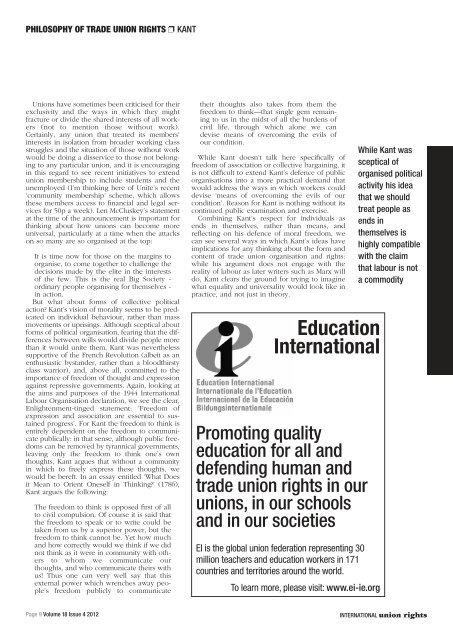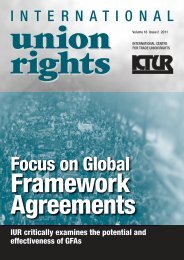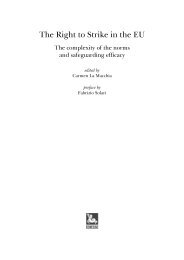International Centre for Trade Union Rights
International Centre for Trade Union Rights
International Centre for Trade Union Rights
You also want an ePaper? Increase the reach of your titles
YUMPU automatically turns print PDFs into web optimized ePapers that Google loves.
PHILOSOPHY OF TRADE UNION RIGHTS ❐ KANT<br />
<strong>Union</strong>s have sometimes been criticised <strong>for</strong> their<br />
exclusivity and the ways in which they might<br />
fracture or divide the shared interests of all workers<br />
(not to mention those without work).<br />
Certainly, any union that treated its members’<br />
interests in isolation from broader working class<br />
struggles and the situation of those without work<br />
would be doing a disservice to those not belonging<br />
to any particular union, and it is encouraging<br />
in this regard to see recent initiatives to extend<br />
union membership to include students and the<br />
unemployed (I’m thinking here of Unite’s recent<br />
‘community membership’ scheme, which allows<br />
these members access to financial and legal services<br />
<strong>for</strong> 50p a week). Len McCluskey’s statement<br />
at the time of the announcement is important <strong>for</strong><br />
thinking about how unions can become more<br />
universal, particularly at a time when the attacks<br />
on so many are so organised at the top:<br />
It is time now <strong>for</strong> those on the margins to<br />
organise, to come together to challenge the<br />
decisions made by the elite in the interests<br />
of the few. This is the real Big Society -<br />
ordinary people organising <strong>for</strong> themselves -<br />
in action.<br />
But what about <strong>for</strong>ms of collective political<br />
action? Kant’s vision of morality seems to be predicated<br />
on individual behaviour, rather than mass<br />
movements or uprisings. Although sceptical about<br />
<strong>for</strong>ms of political organisation, fearing that the differences<br />
between wills would divide people more<br />
than it would unite them, Kant was nevertheless<br />
supportive of the French Revolution (albeit as an<br />
enthusiastic bystander, rather than a bloodthirsty<br />
class warrior), and, above all, committed to the<br />
importance of freedom of thought and expression<br />
against repressive governments. Again, looking at<br />
the aims and purposes of the 1944 <strong>International</strong><br />
Labour Organisation declaration, we see the clear,<br />
Enlightenment-tinged statement: ‘Freedom of<br />
expression and association are essential to sustained<br />
progress’. For Kant the freedom to think is<br />
entirely dependent on the freedom to communicate<br />
publically: in that sense, although public freedoms<br />
can be removed by tyrannical governments,<br />
leaving only the freedom to think one’s own<br />
thoughts, Kant argues that without a community<br />
in which to freely express these thoughts, we<br />
would be bereft. In an essay entitled ‘What Does<br />
it Mean to Orient Oneself in Thinking?’ (1786),<br />
Kant argues the following:<br />
The freedom to think is opposed first of all<br />
to civil compulsion. Of course it is said that<br />
the freedom to speak or to write could be<br />
taken from us by a superior power, but the<br />
freedom to think cannot be. Yet how much<br />
and how correctly would we think if we did<br />
not think as it were in community with others<br />
to whom we communicate our<br />
thoughts, and who communicate theirs with<br />
us! Thus one can very well say that this<br />
external power which wrenches away people’s<br />
freedom publicly to communicate<br />
their thoughts also takes from them the<br />
freedom to think—that single gem remaining<br />
to us in the midst of all the burdens of<br />
civil life, through which alone we can<br />
devise means of overcoming the evils of<br />
our condition.<br />
While Kant doesn’t talk here specifically of<br />
freedom of association or collective bargaining, it<br />
is not difficult to extend Kant’s defence of public<br />
organisations into a more practical demand that<br />
would address the ways in which workers could<br />
devise ‘means of overcoming the evils of our<br />
condition’. Reason <strong>for</strong> Kant is nothing without its<br />
continued public examination and exercise.<br />
Combining Kant’s respect <strong>for</strong> individuals as<br />
ends in themselves, rather than means, and<br />
reflecting on his defence of moral freedom, we<br />
can see several ways in which Kant’s ideas have<br />
implications <strong>for</strong> any thinking about the <strong>for</strong>m and<br />
content of trade union organisation and rights:<br />
while his argument does not engage with the<br />
reality of labour as later writers such as Marx will<br />
do, Kant clears the ground <strong>for</strong> trying to imagine<br />
what equality and universality would look like in<br />
practice, and not just in theory.<br />
Education<br />
<strong>International</strong><br />
Promoting quality<br />
education <strong>for</strong> all and<br />
defending human and<br />
trade union rights in our<br />
unions, in our schools<br />
and in our societies<br />
EI is the global union federation representing 30<br />
million teachers and education workers in 171<br />
countries and territories around the world.<br />
To learn more, please visit: www.ei-ie.org<br />
While Kant was<br />
sceptical of<br />
organised political<br />
activity his idea<br />
that we should<br />
treat people as<br />
ends in<br />
themselves is<br />
highly compatible<br />
with the claim<br />
that labour is not<br />
a commodity<br />
Page 9 Volume 18 Issue 4 2012<br />
INTERNATIONAL union rights





